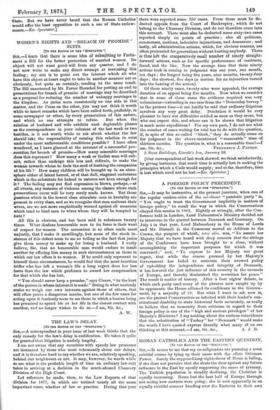THE LAW'S DELAY.
(TO THE EDITOR OF THE "SPECTATOR."] ZIR,—A correspondent in your issue of last week thinks that the only remedy for the law's delay is codification. He takes it quite for granted that litigation is unduly lengthy.
I am not aware that any countries with speedy law processes are instanced by those who most vehemently abuse our delays, -and it is therefore hard to say whether we are, relatively speaking, behind our neighbours or not. It may, however, be worth while to see what is the probable length of time an ordinary law-suit takes in arriviog at a decision in the much-abused Chancery Division of the High Court.
Let reference be made, then, to the Law Reports of that division for 1877, in which are noticed nearly all the more important cases, whether of law or practice. During that year
there were reported some 350 cases. From these must be de- ducted appeals from the Court of Bankruptcy, which do not belong to the Chancery Division, and do not therefore come into this account. There must also be deducted some sixty-two cases reported simply on points of practice ; also all petitions, summonses, motions, indecisive injunctions, and demurrers ; and lastly, all administration actions, which, for obvious reasons, are often protracted for generations without hurting anybody. There is thus left the comparatively small number of ninety straight- forward actions, such as for specific performance of contracts, fraud, and the like. Now the average time that these ninety actions took in coming to judgment was one year, one month, ten days ; the longest being five years, nine months, twenty-four days ; the shortest, five days (a motion for an injunction turned into the hearing of the action).
Of these ninety cases, twenty-nine were appealed, the average duration of an appeal being five months. Now when we consider that in some of these cases the evidence required was very voluminous—extending in one case from the " Domesday Survey" to the present time—it can hardly be said that ordinary litigation involves any very great delay. Doubtless it would be very pleasant to have our difficulties settled as soon as they arose, but who can expect this, and where can it be shown that litigation is much more expeditious ? For my own part, I do not see what the number of cases waiting for trial has to do with the question, if, in spite of this so-called "block," they do actually come on for judgment in the above-mentioned " reasonable " time of thirteen months. The question is, what is a reasonable time?—I
am, Sir, &c., FREDERICK J. PATTON-. 5 Stone Buildings, Lincoln's Inn, January 28.
[Our correspondent of last week showed, we think satisfactorily, by giving instances, that much time is actually lost in seeking the principles which a Code would supply ; and so far, therefore, time is lost which need not be lost. —En. Spectator.]


































 Previous page
Previous page